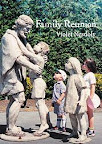Title: River Rising
Author: Athol Dickson
Genre: Historical Fiction
Publisher: Bethany House, 2005
ISBN: 0-7642-0162-X
Athol Dickson’s River Rising opens with Hale Poser, former reverend with a bad hip, poling his pirogue through the fog and up to the dock of the stilt town near the mouth of the Missisippi. He comes at the beckon of a deep desire to find his roots with his only map the word ‘Pilotville’ scribbled on a yellowed piece of paper.
From the beginning his presence stirs up the town. Where did he find those persimmons, wonders Jean, who has no choice but to allow him to tie up the pirogue at his dock in exchange for the offering. Why, when he stands with his arms outstretched in seeming supplication, do the white and black congregations worship in unison? And does he have some kind of supernatural power, to turn Rosa Lamont’s breech baby so that just hours later beautiful Hannah is born naturally?
When Baby Hannah goes missing the next morning, Hale joins the searchers. Unlike the rest of them, he sticks with Hannah’s grief-stricken father long after the time when the police have given up, and despite many not-so-subtle hints that his suggestions of where to look are unwelcome. Finally, becoming a suspect in her disappearance himself and deserted by all who promised to help, he heads into the sinister swamp to continue searching on his own.
One of the strengths of the book is its atmosphere An admitted lover of boats, the river and the Louisiana swamplands, Athol Dickson has created, in the stilt town of Pilotville and the murky surrounding swamps – with their stands of tupelo and cypress, their curtains of willow and Spanish moss, their spooky animal sounds against the irritating hum of mosquitoes – a setting that is completely believable. This setting, in turn, is a perfect backdrop to the evil that lurks under Pilotville’s idyllic surface.
His characters are also intriguing and colorful. Besides the book’s main man Hale Poser, whose childlike faith morphs into fantasies of violence under the pressure of events, there are plenty of others.
Some we love:
It was the old woman again with the same voice...He felt the blessed coolness of the moist rag upon his lips... “Shh. Shh,” she whispered. “Lie still and it’ll come...” - p.116.
Others we hate
Qana leapt forward and seized it...knowing he would kick her out of the way as if she were a dog, Marah scrambled back. The big man ignored her and squatted beside the coals to eat, shoulders hunched and eyes scanning those nearby with naked animosity. - p. 140.
And still others we wonder about:
“A minister turned janitor...” Papa shook his head and Dorothy watched the old man’s triple chins shake like jelly. “Nurse Truett tells me you saved Rosa Lamont’s life.”
“And her baby,” said Dorothy.
For some reason her words seemed to annoy Papa. He frowned and in spite of living on an island of equality, she felt a little anxious. - p. 38.
Dickson does not hesitate to sink his teeth into some pretty grand themes. Relations between Negroes and whites is one. He especially explores the way the Christian characters have managed to erect walls to separate blacks and whites. Redemption and the miraculous are other themes he tackles often and by several means. One is to introduce, early in the story and sustain throughout, a not-so-subtle allusion to the biblical story of Moses.
If the book has flaws it would be in the area of plotting where once or twice the story felt contrived to me. The odd time the characters’ actions also seemed contradictory and as if manipulated to better fit with the symbolic icon they'd been linked to, rather than allowed to be true to themselves.
The book is set during the Mississippi flood of 1927. When asked, after Hurricane Katrina, if he wrote the book because of that, Dickson replied: “No, I finished River Rising about a year before Hurricane Katrina hit, so that’s just a coincidence.” In fact, the possibility that people would think he had written the book to take advantage of the tragedy didn’t even occur to him until his publisher brought it up some weeks after the storm. His response when asked about it: “I hope people aren’t that cynical. We’ll see, I guess.”
All in all, I'd recommend the book as a gripping read delivering--despite its dark, rain-soaked sections--a message of hope in the voice of a skilled storyteller.
***********************
Filed in: Book Reviews

0 comments:
Post a Comment